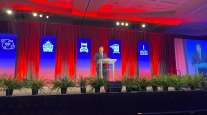Senior Reporter
Excise Tax Relief Would Benefit Trucking, ATA’s Chris Spear Says

[Ensure you have all the info you need in these unprecedented times. Subscribe now.]
Federal policymakers crafting additional ways to restore economic stability amid the COVID-19 pandemic should consider suspending a World War I-era federal excise tax on the sale of new trucks and trailers, a coalition of freight stakeholders said April 28.
In a letter to congressional leaders, the Modernize the Truck Fleet coalition urged them to approve a suspension of the excise tax through 2021.
“As representatives of the trucking industry and other important sectors of the economy, we believe that the suspension of the FET would serve as an extremely effective and immediate policy to spur the sales of newer, cleaner trucks, which would retain jobs in the trucking sector and help rebuild our economy,” wrote the group, led by American Truck Dealers, a division of the National Automobile Dealers Association.
Industry Letter on FET Susp... by Transport Topics on Scribd
The group has said the levy has the potential to add $12,000 to $20,000 to the cost of new trucks and trailers.

Spear
American Trucking Associations is a member of the coalition. ATA President Chris Spear told Transport Topics on April 28: “Like our customers across the economy, the trucking industry is suffering during this coronavirus crisis and shutdown.
RELATED: Trucking to Play Critical Role in Restarting Economy, ATA’s Chris Spear Says
“Truckers aren’t looking for a bailout as they keep America moving during these challenging times and prepare for our eventual recovery, but a tax holiday on the antiquated federal excise tax would be good medicine to help with liquidity and to stimulate the purchase of newer, safer trucks and trailers.”
Other coalition members include the American Highway Users Alliance, the American Road and Transportation Builders Association and the National Association of Truckstop Operators.
In a letter sent to congressional leaders last year, the coalition explained the excise tax adds cost that serves as a disincentive to fleets that might otherwise invest money in safety technologies on trucks.
“While new commercial trucks are the safest they have ever been, these new safety systems are expensive,” the group said.
Last year, two House lawmakers introduced the Modern, Clean, and Safe Trucks Act of 2019 to repeal the excise tax. Senate companion legislation has also been introduced, but neither measure has garnered sufficient approval to advance to the president’s desk for enactment.

Rep. Doug LaMalfa (R-Calif.) speaks at a hearing on trucking in June. (Rep. Doug LaMalfa via YouTube)
“When the [federal excise tax] was introduced over 100 years ago, it was to help pay the costs of fighting World War I. Today, it has quadrupled from 3% to 12%, and the Ottoman Empire is no longer around. It’s an outdated and unnecessary barrier that discourages truck buyers from upgrading to more modern, cleaner and safer vehicles,” Rep. Doug LaMalfa (R-Calif.) said during the bill’s introduction. He is a member of the Transportation and Infrastructure Committee.
“The federal excise tax is an outdated burden to small businesses looking to invest in our transportation industry. Repealing this tax would encourage new and cleaner fuel-efficient vehicles on our roads,” added Rep. Collin Peterson (D-Minn.) a co-sponsor and chairman of the Agriculture Committee.
Jodie Teuton, chairwoman of the American Truck Dealers, is a coalition member and vice president of Kenworth of Louisiana. When the House bill was unveiled, she said, “This tax is as outdated as biplanes and trench warfare. [The coalition] applauds the bipartisan leadership Reps. Peterson and LaMalfa have shown by introducing this bill.”
Since President Donald Trump signed a third coronavirus emergency measure into law, providing more than $2 trillion of health care and economic relief, the president and congressional leaders have signaled interest in proceeding with additional measures potentially centering on infrastructure policy and the freight sector.
The president has insisted that funding infrastructure networks would benefit the trucking sector. He touted the industry’s contributions at the White House on April 16: “With the same spirit of faith and grit and abiding patriotism that defines everything they do,” he said, “we know our truckers will never let us down under any circumstance.”
Want more news? Listen to today's daily briefing:




